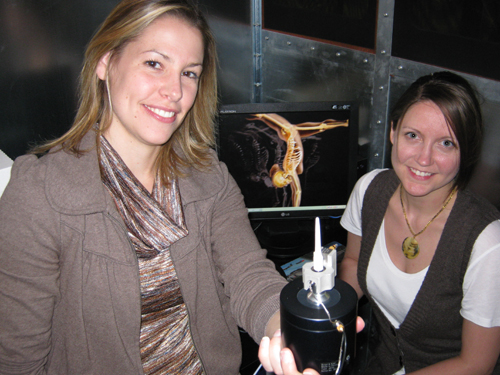Researcher Studying Astronauts' Feet for Clues to Improve Balance in Seniors
May 17, 2010 - News Release
A University of Guelph investigation into why an astronaut's feet tingle during a space mission could lead to improving balance in seniors.
Prof. Leah Bent is testing the changes in skin sensitivity on the bottom of astronauts' feet before and after flight to determine which balance receptors are more active when the body is in zero gravity.
 “We depend on a number of receptors for balance, such as our eyes, inner ear, joints, muscles and the skin on the bottom of our feet,” said Bent, a faculty member in the Department of Human Health and Nutritional Sciences who is working on the study with PhD student Catherine Lowrey. “But when you are in zero gravity, you lose balance information from your inner ear; as a result, the body has to compensate and increase its reliance on the other sensory systems.”
“We depend on a number of receptors for balance, such as our eyes, inner ear, joints, muscles and the skin on the bottom of our feet,” said Bent, a faculty member in the Department of Human Health and Nutritional Sciences who is working on the study with PhD student Catherine Lowrey. “But when you are in zero gravity, you lose balance information from your inner ear; as a result, the body has to compensate and increase its reliance on the other sensory systems.”
The two researchers recently returned from the Johnson Space Centre in Houston, Texas, where they tested three of the six crew members of the space shuttle Atlantis, which is set to launch May 14 for a 12-day mission.
Although still in the initial stages, the research project has received attention from media, including CTV, CBC and Yahoo News as well a number of Ontario newspapers.
The Canadian Space Agency has also posted a description of Bent's study on its website and will be posting two or three questions from an interview with the Guelph professor each day throughout the 12-day mission.
Bent predicts that the experience of zero gravity causes the body to place more reliance on the skin receptors on the bottom of the feet when trying to keep balance during daily activities and space walks. This explains why astronauts experience hypersensitivity in their feet during and shortly after a flight mission.
“Space flight provides a unique situation where functioning and healthy individuals experience changes in their vestibular systems, which allows us to investigate how this influences the importance of skin in balance,” she said. “By testing the different receptors on the bottom of the feet, we are hoping to reveal which play the most important role in balance.”
If they are able to pinpoint which receptors are vital to balance, the researchers will be able to focus on these areas when developing technologies to improve balance in earth-bound seniors.
“Part of the reason seniors lose their ability to balance is because the skin on the bottom of the feet becomes thicker and less hydrated, so it’s less sensitive,” said Bent.
The research also has potential benefits for alleviating the tingling sensation that astronauts experience, particularly during long-term explorations.
Bent’s Hypersole study, which is funded by the Canadian Space Agency, tests sensitivity levels by stimulating the different receptors on the bottom of the feet, including those that detect pressure, slipping, stretching and contact with a surface. Each receptor responds at a different frequency level. By touching the bottom of the foot with a vibrating probe, she can determine the magnitude of the stimulation that activates the receptors, based on when the subject can detect the vibration.
The same test will be performed when the astronauts return from flight to determine if there are any changes in sensitivity levels after experiencing zero gravity. In addition to testing the Atlantis astronauts, the study will look at crew members on the two following space missions on Discovery and Endeavour.
Contact:
Prof. Leah Bent
Department of Human Health and Nutritional Sciences
519-824-4120, Ext. 56442
lbent@uoguelph.ca
For media questions, contact Communications and Public Affairs: Lori Bona Hunt, 519-824-4120, Ext. 53338, or l.hunt@exec.uoguelph.ca, or Deirdre Healey, Ext. 56982 or d.healey@exec.uoguelph.ca.